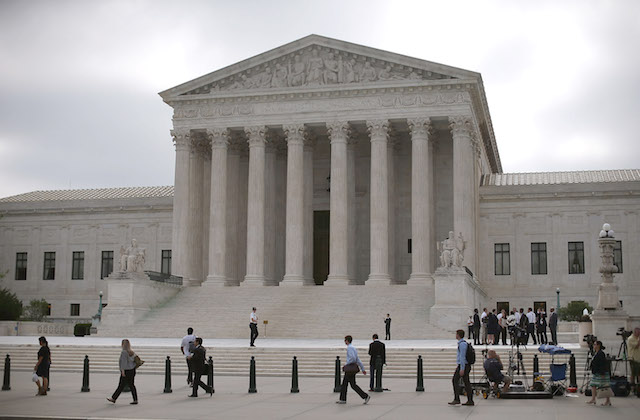This week, the Supreme Court of the United States (SCOTUS) could decide the future of Roe v. Wade, the 1973 court case that legalized abortion nationwide.
The justices will rule on an emergency motion that was presented to SCOTUS last Monday (January 28) to halt a restrictive Louisiana abortion law. In an application, two unnamed physicians, represented by the Center for Reproductive Rights, asked the court to prevent Act 620 from going into effect on February 4. The law states that doctors who perform abortions must have admitting privileges at a hospital within 30 miles of their clinic.
On Friday (February 1), Justice Samuel Alito said the judges needed more time to make a decision and they were putting the law on hold until February 7, reports CNN.
According to CNBC, five justices are required to grant an emergency stay. This means that one of the court’s five conservatives will have to side with the liberal judges to prevent the Louisiana law from going into affect.
A very similar case, Whole Woman’s Health v. Hellerstedt, was heard by SCOTUS in 2016. Per Slate:
rnt
The Louisiana law at issue, Act 620, was modeled after the Texas statute that the court struck down in Whole Woman’s Health. Like that measure, Act 620 requires abortion providers to obtain admitting privileges at a hospital within 30 miles of their clinic. As one judge on the 5th U.S. Circuit Court of Appeals wrote, the Texas and Louisiana laws are “almost identical.” And because the Supreme Court invalidated the Texas statute as an “undue burden” on the constitutional right to abortion access, you might expect the 5thCircuit to strike down the Louisiana measure on the same grounds.
That was 2016. Today, President Donald Trump (who vowed on “60 Minutes” to pick “pro-life” judges) has appointed Neil Gorsuch and Brett Kavanaugh, two anti-abortion justices who give the court a conservative majority.
If this law is upheld, for women in Louisiana it would mean about one-third of the state’s abortion clinics would close, reports Slate. Alarmingly, only one doctor who provides abortion services in the state has admitting privileges to a hospital, meaning this physician alone would have to perform all abortions in Louisiana. About 10,000 women a year seek abortions in the state, reports CNN.
For women throughout the United States, should SCOTUS choose to uphold the law, they must now contend with states that have been emboldened by Louisiana. “Less than three years ago, the Supreme Court struck down an identical law in Texas, holding that it served no purpose other than to restrict access to safe and legal abortion,” said Nancy Northrup, the president of the Center for Reproductive Rights. “The Fifth Circuit has brazenly ignored this precedent squarely on point.”
Reports Slate:
rnt
It would indicate that the Supreme Court’s new majority has retreated from Whole Woman’s Health, signaling that states are free to ignore it and pass stringent laws targeting abortion clinics. Once Whole Woman’s Health is functionally overturned, Roe itself will be next on the chopping block. After all, Whole Woman’s Health really just re-affirmed the fundamental principle that states may not devise pretextual excuses to deny women control over their reproductive rights. Once that rule is scrapped, states will be unleashed to regulate abortion out of existence within their borders.
Recently, a number of states have passed laws to protect a woman’s right to abortion in case Roe is overturned. On the 46th anniversary of Roe v. Wade, January 22, New York State passed the Reproductive Health Act, which removes the procedure from the state’s criminal code and makes the protections given to women by Roe state law. New Jersey, California and Maryland are some of the other states that protect abortion, either through their state constitution or legislation.
